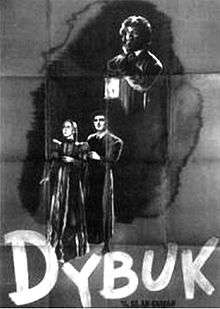The Dybbuk (film)
| The Dybbuk | |
|---|---|
 | |
| Directed by | Michał Waszyński |
| Produced by | Zygfryd (or Zygmunt) Mayflauer[1] |
| Written by |
S. Ansky (play), S. A. Kacyzna (writer) |
| Music by | Henryk Kon |
| Cinematography | Albert Wywerka |
| Edited by | George Roland |
Release dates | 26 September 1937 |
Running time |
125 minutes (original), 108 minutes (USA), 110 minutes (existing print) |
| Country | Poland |
| Language | Yiddish |
The Dybbuk (Yiddish: דער דיבוק, Der Dibbuk; Polish: Dybuk) is a 1937 Yiddish language Polish fantasy film drama directed by Michał Waszyński. It is based on the play The Dybbuk by S. Ansky.
The Dybbuk, or Between Two Worlds (Yiddish: דער דיבוק, אָדער צווישן צוויי וועלטן Der Dibbuk, oder Tswishen Tswei Welten) is a 1914 play by S. Ansky, relating the story of a young bride possessed by a dybbuk – a malicious possessing spirit, believed to be the dislocated soul of a dead person – on the eve of her wedding. The Dybbuk is considered a seminal play in the history of Jewish theatre, and played an important role in the development of Yiddish theatre and theatre in Israel. The play was based on years of research by Ansky, who traveled between Jewish shtetls in Russia and Ukraine, documenting folk beliefs and stories of the Hassidic Jews.
In 1937, the play, with some changes in the plot structure, was filmed by director Michał Waszyński in Kazimierz Dolny and Warsaw, starring Lili Liliana as Leah, Leon Liebgold as Hannan (Channon, in the English-language subtitles), and Abraham Morewski as Rabbi Azrael ben Hodos. The film adds an additional act before those in the original play: it shows the close friendship of Sender and Nisn as young men. Besides the language of the film itself, the picture is noted among film historians for the striking scene of Leah's wedding, which is shot in the style of German Expressionism. The film is generally considered one of the finest in the Yiddish language. The Dybbuk was filmed on location in Kazimierz Dolny, Poland, and at the Falanga Film Studios in Warsaw, Poland.
Cast
- Abraham Morewski as Rabbi Ezeriel ben Hodos
- Ajzyk Samberg as Meszulach, the messenger
- Mojżesz Lipman as Sender Brynicer ben Henie
- Lili Liliana as Lea – Sender's daughter
- Leon Liebgold as Chanan ben Nisan
- Dina Halpern as Aunt Frade
- Max Bozyk (as Maks Bozyk) as Nute, Sender's friend
- M. Messinger as Menasze, the prospective groom
- Gerszon Lemberger as Nisan ben Rifke
- Samuel Bronecki (as S. Bronecki) as Nachman, Menasze's father
- Samuel Landau as Zalman, matchmaker
- Abraham Kurc as Michael
- Judith Berg as Dancer
- Symcha Fostel
- Zisze Kac as Mendel
References
- ↑ Zygmunt Mayflauer at Internet baza folmowa (Polish)